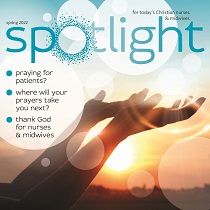One question I'm repeatedly asked is, 'Am I allowed to share my faith and pray with patients? What if I get struck off?'
Legally, you are allowed to talk about your faith and pray with patients if it's done in the right way, which we'll have a look at. But even if legally you're covered, you may well become unpopular, marginalised, and talked about. Some colleagues and some relatives of patients may have axes to grind and take offence even when a conversation or prayer is initiated and welcomed by a patient. We need to be prepared for opposition and consider if we're willing to pay the cost.
The NMC code makes it very clear that we should not be pushing our faith on people in our care:
20.7 make sure you do not express your personal beliefs (including political, religious or moral beliefs) to people in an inappropriate way.[emphasis mine] [1]
Expressing our beliefs inappropriately means in a coercive manner or exploiting a patient's vulnerability. We would all agree with that - Jesus never pushed himself on anyone. He always responded to requests, asked people what they wanted, acted with permission. However, the code implies that there is room to express beliefs appropriately.
Pray with people, but at their request. Respond to people's questions with compassion and respect.
The overarching principle for us is summed up by 1 Peter 3:15b: Always be prepared to give an answer to everyone who asks you to give the reason for the hope that you have. But do this with gentleness and respect.
However, no one will ask you questions about your faith or for prayer unless they know that you are someone for whom a faith in Jesus is important. It's easy to give small clues to indicate that you are a person of faith. Although the wearing of a cross necklace is usually prohibited at work - not on religious grounds but rather for Health & Safety reasons, most trusts do still permit the wearing of a lapel badge. Wearing a small cross, dove or ichthus badge, or a CMF lanyard, could stimulate interest in patients and colleagues. As could raising the fact that you enjoyed worshipping at church and the love of your church community when you talk about what you did at the weekend (in response to asking them first what they usually do at weekends and hoping they enquire back!). Maybe ask your patient if they have faith to help them at a tough time like this, or a supportive community to return to?
Jesus was the master of the skilful use of questions; he was able to draw people out. We can learn to use questions like Jesus did, to help patients open up and maybe lead to a conversation or an invite for you to share your own hope.
None of these little 'faith flags' require any response from those around you and should never be forced. But they do open the door for people to ask questions or even to ask for prayer.
Don't be frustrated that such opportunities don't arise every day. You honour God in the way you do your work, it's not just about verbally testifying to him. But do pray! God is the one who opens hearts and creates opportunities. Pray as you go to work. Silently pray for your patients and be open to any opportunity.
And have confidence that faith is relevant to healthcare. There's bags of research showing that faith positively affects health outcomes in patients. [2]
God is on our side. We may have to count the cost of sharing our faith in the workplace and praying for patients, but what a joy it is to honour him, to share the hope we have, and to see him at work!
Pippa Peppiatt is CMF Head of Nurses & Midwives
any expression of faith in the clinical setting can risk censure
































